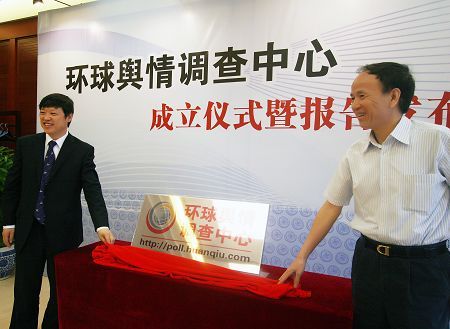China still a developing nation: poll
Two separate surveys of people in seven cities revealed that most believe China is still a developing nation, and that it faces military threats from major powers. They also said the income-disparity issue will remain the biggest challenge to social stability in the next 10 years.
 |
|
He Chongyuan (right), vice president of People's Daily, and Hu Xijin, editor-in-chief of the Global Times, are seen at the launch ceremony of the Global Poll Center Thursday. |
Those findings were found in two reports based on two surveys of Chinese citizens in seven cities - Beijing, Shanghai, Guanzhou, Chengdu, Shenyang, Xi'an and Changsha - that were conducted by the Global Poll Center.
The center, unveiled Thursday in Beijing, released two reports at the ceremony that analyzed the results of the surveys.
One, including the opinions of 1,296 people aged between 8 and 64, focused on the public's view of China's international status. It found that 78 percent of the interviewees feel that China is a developing country and not yet a developed one.
Nearly half of them believe it will take 20 years to catch up with the US, though it was reported that China has overtaken Japan to be the world's second-largest economy.
Dai Yuanchu, director of the center, said it is important to have a clear awareness of China's status, or the country will get lost in praises and criticism.
Zhang Shengjun, vice dean of the Institute of International Relations at Beijing Normal University, told the Global Times that the results reflect a sober and rational judgment of China's international status, despite the adulation of the foreign media.
China's Gross Domestic Growth (GDP) in 2009 stood at US$4.9 trillion and the per capita GDP was just US$3,700, far behind developed countries.
However, the public feels China's foreign influence is growing. About 76 percent believe that China now has a say in international issues.
Han Xudong, a professor at the National Defense University, noted that the public has mistaken the definition of "having a say" as "the right to speak."
"China, with growing economic strength and rising international status, does receive more attention than before and get its voice heard. However, it hasn't got a say, which means playing a leading role in the international political situation," Han said.
Shen Dingli, vice-dean of the Institute of International Studies at Fudan University, said real influence does not come from economic power, but from commonly accepted values and thinking, which are absent in China.
 0
0 







Go to Forum >>0 Comments